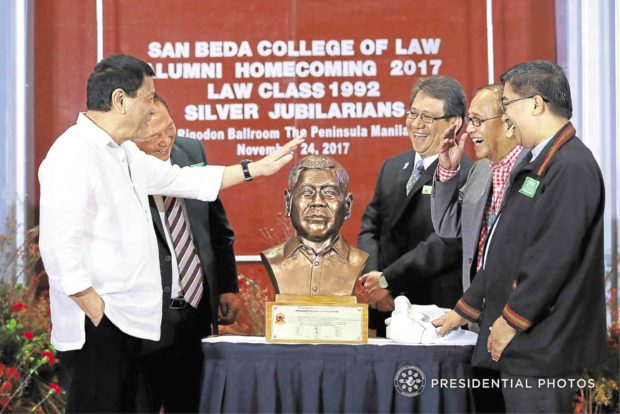Survey: Davaoeños back antidrug war but believe EJKs happening

‘BEDAN OF THE YEAR’ President Duterte is presented with a bust as “Bedan of the Year” during the San Beda Law annual alumni homecoming at The Peninsula Manila in Makati City on Friday. —MALACAÑANG PHOTO
DAVAO CITY — President Rodrigo Duterte’s townmates believe that killings linked to illegal drugs, drug trafficking and terrorism were the most serious threats to peace and order, according to a survey by the Jesuit-run Ateneo de Davao University.
The results of the survey by Ateneo’s Social Research Training and Development Office released on Friday, also showed the former Davao City mayor’s constituents overwhelmingly supported the way he was trying to solve the drug problem in the country.
The Citywide Social Survey polled 630 randomly selected respondents aged 18 to 86 in the city’s three political districts from Oct. 21 to Oct. 25.
It defined extrajudicial killings (EJKs) as killings perpetrated by state agents outside the judicial process.
The survey said 41.1 percent of Davaoeños said EJKs were happening and 27.5 percent did not believe there were.
Article continues after this advertisementIt said 51.8 percent pointed to drug syndicates as responsible for most of the killings. Vigilantes were tagged by 35.7 percent and only 17.7 percent blamed the police, according to the survey, which elicited multiple answers to some of the survey questions.
Article continues after this advertisementThe survey said 38.6 percent believed drug suspects who were killed did not fight back but 45.1 percent thought otherwise and the police were justified in their actions that led to the deaths of the alleged drug offenders.
Because of this, 44.6 percent still trusted the police, with 11 percent saying they believed policemen respected human rights. Only 6.4 percent said they feared the police.
The police said officers nationwide have killed close to 4,000 people who allegedly fought back during drug raids since the President took office last year.
Asked what they considered were the most serious threats to peace, the killings were mentioned by 30.5 percent, terrorism by nearly 30 percent (29.2 percent) and 32.4 percent said illegal drugs and drug trafficking were the top threats. Another 21.9 percent pointed to criminal incidents.
Did they agree with, or favor the manner by which the Duterte administration was trying to solve the illegal drug problem? Yes, said 92.7 percent. Only 3.9 percent disagreed.
The Ateneo survey said 77.7 percent were very satisfied with the President’s performance in the antidrug campaign and only 0.9 percent were dissatisfied.
Overall, 89.2 percent believed that Mr. Duterte had fulfilled his campaign promise to fight illegal drugs.
The so-called Davao Death Squad (DDS), whose operation was allegedly supported by
Mr. Duterte when he was Davao City mayor, was also considered a factor that threatened peace and order by 16.7 percent although 26.8 percent disagreed.
An investigation by the Commission on Human Rights in 2009, then chaired by now-jailed Sen. Leila de Lima, said more than 900 people suspected of involvement in drugs and other crimes were killed by the shadowy DDS.
Mr. Duterte has denied any involvement in the death squad and despite the thousands killed in his war on drugs, he has remained well-loved by the people of this city. —With reports from Joselle Badilla and Allan Nawal